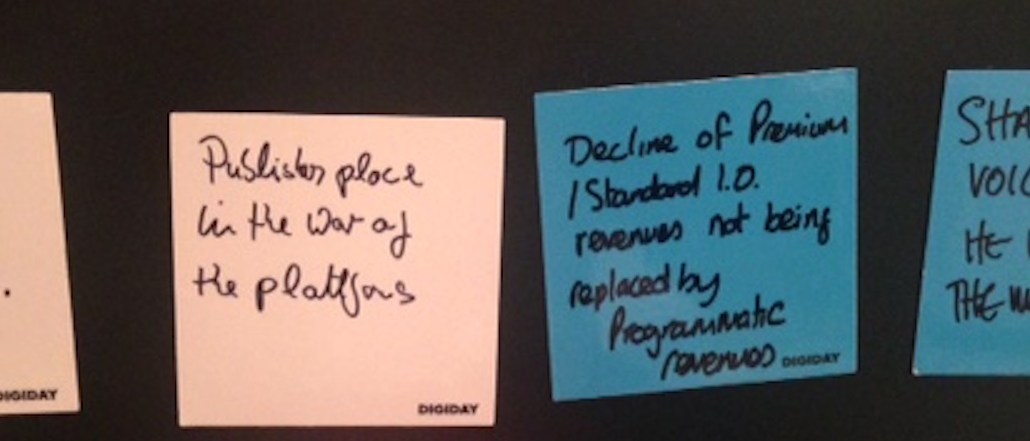Secure your place at the Digiday Media Buying Summit in Nashville, March 2-4
Who will be the gatekeeper?: European publishers confess their biggest challenges

For publishers, times have never been more challenging. At the Digiday Publishing Europe Summit this week in Bologna, leading publishers from across Europe came together to discuss what they’re dealing with in the industry.
Attendees were asked to write down the single biggest challenge they’re facing today. We asked some of them, anonymously, to elaborate on what’s really keeping them awake at night.
Their answers, edited for clarity, are presented below their hand-written notes:

The publisher’s place in the platform wars
“The biggest challenge is the role of the publisher in the war of the platforms: Who is driving the game? Who will be the gatekeeper and what will the rules be? If your content is not on your own destination, it’s difficult to own that destination. Publishers need to take a close look at to which degree they want to be on those platforms. Publishers will still go to platforms but they need to monitored. They need to have certain rules — for example editorial freedom, whether you can sell your paid content on that platform. This is necessary to survive as a publisher, so they need to take a closer look at what they are doing.”

Share of voice vs. ad tech
“The current proliferation of ad tech companies will and has to end. The big four will own the infrastructure and your business will need clear strategies to play and make profit on their platforms. An ad tech business entering the market must dovetail with this new world order.”

Metrics, metrics, metrics
“For us it’s understanding how successful branded content is. We have an in-house production shop so we produce a lot of content. And it’s about going beyond the standard metrics, so for example saying to a client ‘we’ll sell you a branded content campaign featuring a series of articles and videos, and the metric of success will be X number of video views on video content and X number of visits to the articles. But that’s maybe a bit superficial. You’re not truly understanding whether that content has worked or not, because people don’t know yet.”

The revenue gap
“My deepest darkest fear for publishers is that standard insertion order business is not being replaced at the same rate by programmatic trading. Until three years ago, that was your core revenue stream. Aggressive publisher business models have been built on the back of a sustainable class one IO business model, with creative solutions and programmatic adding incremental revenue. But programmatic trading isn’t replacing that traditional revenue stream, and that keeps me awake at night. That’s led to a lot of diversification of revenue streams. But you have to focus on what you are as a digital brand, and not try and be everything to everyone. There’s an over-diversification and over-complication of revenue streams, and not all of them deliver. Native may provide bigger deals, but not at the same volume. Header bidding is a great initiative, but again it’s nickel and dime money. It’s not a direct replacement of your premium CPM inventory, which is in decline. Where will that net out over the next two years? That’s the concern.”

Are apps the answer?
“Our biggest challenges in the current climate is whether to build more apps or focus reaching audiences on platforms. With players like Quartz releasing its app it’s breathed more life into the market again. You don’t know whether you’re acquiring an engaged audience. If they are engaged in the app then they are 10 times more engaged than Web audiences, and are easier to monetize. App audiences exist outside of ad blocking, so they allow us to get around the other challenges.”
More in Media

From feeds to streets: How mega influencer Haley Baylee is diversifying beyond platform algorithms
Kalil is partnering with LinkNYC to take her social media content into the real world and the streets of NYC.

‘A brand trip’: How the creator economy showed up at this year’s Super Bowl
Super Bowl 2026 had more on-the-ground brand activations and creator participation than ever, showcasing how it’s become a massive IRL moment for the creator economy.

Media Briefing: Turning scraped content into paid assets — Amazon and Microsoft build AI marketplaces
Amazon plans an AI content marketplace to join Microsoft’s efforts and pay publishers — but it relies on AI com stop scraping for free.





